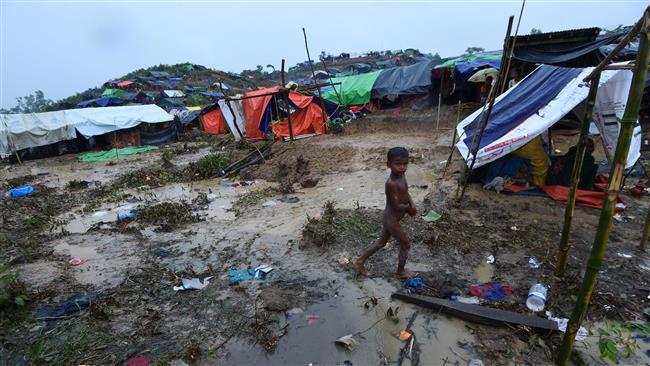
RNA - Media reports said the situation was particularly dire in the village of Ah Nauk Pyin and the nearby Naung Pin Gyi, where any escape route to neighboring Bangladesh is long and arduous.
Maung Maung, a Rohingya official in Ah Nauk Pyin, said the villagers were resigned to leaving, but authorities had not responded to their requests for security. “We’ll starve soon and they’re threatening to burn down our houses,” he told Reuters by telephone. “We’re terrified.”
Another Rohingya, who asked not to be named, said extremist Buddhists came to the same village and chanted, “Leave, or we will kill you all.”
Elsewhere in his remarks, Maung Maung, said he had called Myanmar's police at least 30 times to report threats against his village.
On September 13, the Rohingya official said he had received a call from a Rakhine villager he knew. “Leave tomorrow or we’ll come and burn down all your houses,” the man on the phone had said. When the Rohingya official protested that they had no means to escape, the man replied, “That’s not our problem.”
Maung Maung also said the village elders had sent a letter to Rathedaung authorities on September 7, asking to be moved to “another place”. They had yet to receive a response, he said.
On August 31, Myanmar's police convened a roadside meeting between the two villages. Rohingya residents who attended the meeting said that instead of addressing the Rohingya complaints, the Rakhine officials delivered an ultimatum.
“They said they didn’t want any Muslims in the region and we should leave immediately,” said the Rohingya resident of Ah Nauk Pyin who requested anonymity.
Ah Nauk Pyin sits on a mangrove-fringed peninsula in Rathedaung, one of three townships in Rakhine state. The villagers say they have no boats to leave the volatile region.
Until three weeks ago, there were 21 Rohingya Muslim villages in Rathedaung, along with three camps for Muslims displaced by the previous wave of violence.
Sixteen of those villages and all three camps have since been emptied and in many cases burnt.
Human rights monitors say Rathedaung’s five surviving Rohingya villages and their thousands of inhabitants are encircled by Rakhine Buddhists.
Since 2012, the Rohingya have been too scared to leave the village or till their land, surviving mainly on monthly deliveries from the World Food Program (WFP).
The recent violence halted those deliveries after the WFP pulled out most of its staff and suspended operations in the region after August 25.
Residents in the two Rohingya villages said they could no longer venture out to fish or buy food from Buddhist traders, and were running low on food and medicines.
Since October 2016, Myanmar’s government has laid a siege to the western state of Rakhine, where the Rohingya Muslims are concentrated. There, horrific violence, including killing, rape and torching property, has been taking place against the minority Muslims, according to reports and eyewitnesses.
The attacks have seen a sharp rise since August 25 after dozens of police and border outposts in Rakhine came under attack purportedly by a group claiming to be the defenders of the Rohingya. The alleged assaults were launched in response to a government clampdown in the area, where over a million Rohingya are based.
Rohingya Muslims fleeing violence and persecution in their home country of Myanmar continue to arrive in Bangladesh. Refugees are waiting for handout from aid agencies since they lack food, clean water and shelter. Locals say many of the Rohingya refugees are also sick and wounded. Thousands of the displaced people have been stranded or left without enough food for weeks.
The United Nations says so far more than 400,000 desperate Rohingya Muslims have fled the violence in Myanmar and crossed into neighboring Bangladesh.
Myanmar’s government denies full citizenship to the Rohingya, branding them illegal immigrants from Bangladesh. Dhaka, in turn, regards the desperate refugees as Myanmarese and harshly pushes them back. The Rohingya, however, track their ancestors many generations back in Myanmar.
847/940